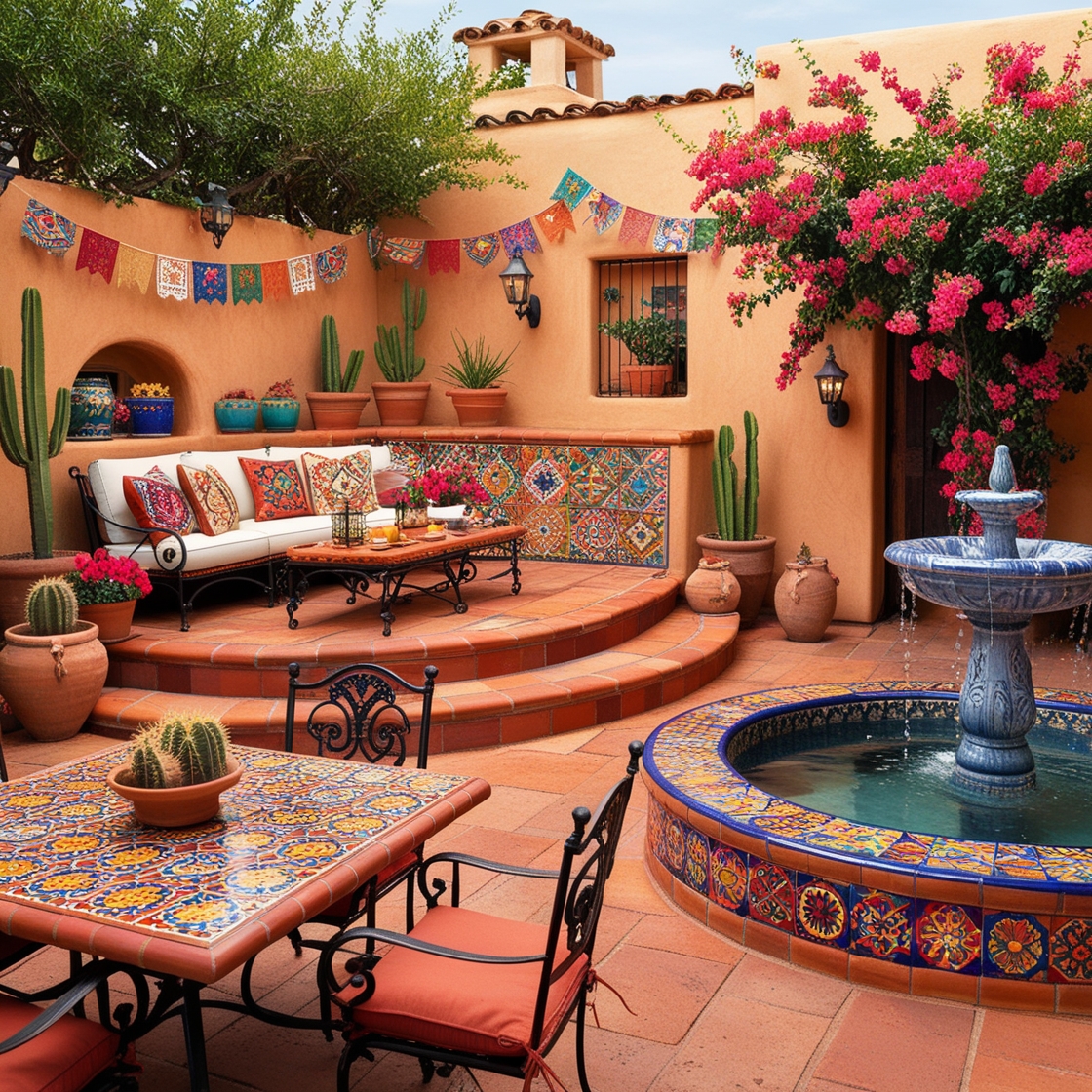Creating a Mexican-inspired outdoor retreat isn’t just about landscaping—it’s about storytelling through design. When done right, an authentic Mexican patio design with Talavera tiles can become the heart of your home. Rich with history, color, and craftsmanship, this aesthetic brings a vibrant, welcoming feel that transforms any backyard, courtyard, or veranda into a soulful sanctuary.
Table of Contents
Whether you’re looking to build a new patio or add character to your existing one, this guide provides you with all the tools, ideas, and inspiration you need to bring this style to life—complete with SEO-friendly structure, expert-backed insight, and timeless design tips.
What Makes a Mexican Patio Truly Authentic?
Authenticity in Mexican design stems from tradition. An authentic patio typically features:
- Talavera tiles: Hand-painted tiles that reflect Mexican heritage
- Natural materials: Clay, wood, wrought iron, and terracotta
- Bold colors: Deep blues, reds, oranges, and earthy tones
- Organic layout: Spaces feel warm, grounded, and connected to nature
- Cultural accents: Pottery, woven textiles, lanterns, and rustic furniture
According to Mexico Desconocido, the design ethos emphasizes “convivialidad”—a sense of gathering, sharing, and vibrant community.
The Legacy of Talavera Tiles in Mexican Design
Talavera pottery originated in Puebla, Mexico, during the 16th century. These hand-glazed, intricately painted tiles are renowned for their durability and cultural significance. Patterns range from florals to geometric shapes, often in striking cobalt blue, yellow, and terracotta tones.
Talavera tiles are commonly used on:
- Patio floors and walls
- Tabletops and countertops
- Fountains and planters
- Outdoor stairs and pool borders
Their resilience and beauty make them a perfect choice for patios exposed to the elements.
Benefits of Talavera Tiles for Outdoor Use
| Feature | Benefit |
|---|---|
| Weather Resistance | Glazed surface repels water and resists cracking |
| Color Durability | Colors remain vivid even under intense sunlight |
| Design Versatility | Complements both rustic and modern aesthetics |
| Eco-Friendly | Handmade using traditional methods and local materials |
| Cultural Appeal | Adds authenticity and storytelling to any design |
Planning Your Authentic Mexican Patio
Define Your Layout
Before choosing tiles or decor, outline how you’ll use your patio:
- Dining area with Talavera-topped tables
- Seating zone with rustic benches and cushions
- Focal point such as a tiled fountain or fireplace
- Pathways connecting garden and lounge areas
Use organic lines and curved edges over rigid geometries for a natural flow.
Choose a Tile Scheme
Decide between:
- All-over tile coverage (great for compact patios)
- Tiled border or centerpiece mosaic
- Mixed tile patterns for bohemian flair
- Solid terracotta with Talavera inlays
Select tiles with varying patterns and colors for a truly Mexican feel, but keep a balance—3–4 core hues max to avoid visual clutter.
Design Elements to Complement Talavera Tiles
Furniture Choices
- Wrought iron: Ideal for tables and chairs, painted in matte black or rustic finishes
- Stained wood: Thick, chunky textures offer warmth
- Equipales: Traditional Mexican leather-wrapped wood seating
Lighting
- Tin lanterns with punched patterns
- String lights over dining zones
- Wall sconces that reflect Spanish colonial design
Plants and Landscaping
- Cacti and succulents in clay pots
- Bougainvillea or jasmine vines climbing pergolas
- Agave or yucca for structure and drought-resistance
🌿 Tip: Group plants in colorful ceramic pots to mirror tile patterns.
Adding Signature Features for Mexican Patio Style
Water Features
- Tiled wall fountains with sun motifs
- Freestanding tiered fountains in stone or clay
Outdoor Fire Elements
- Clay chimineas
- Tiled fire pits for warmth and ambiance
Textiles
- Striped serape-style throws
- Handwoven pillows in jewel tones
Modern Twists on Traditional Talavera Patio Design
Blending old and new is completely possible:
- Pair minimalist furniture with vibrant tile walls
- Use white stucco walls as a neutral backdrop
- Add sleek pergolas over traditional flooring
- Frame Talavera tiles with concrete or metal edging
This approach makes the style accessible even in contemporary homes.
Pinterest-Worthy Examples to Explore
Explore these curated looks directly on our Pinterest board:
👉 Mexican patio ideas – Mexican Elegance Decor
Look for:
- Mosaic tile entry paths
- Courtyard seating corners with bold tile benches
- Vibrant stair risers that double as art
- Potting stations tiled in complementary colors
Maintenance Tips for Talavera Tile Patios
- Seal your tiles annually with an outdoor-grade sealant
- Clean with non-acidic soap to protect glaze
- Use grout sealer to prevent cracking or mold buildup
- Cover during frost in cold climates to avoid damage
Estimated Costs and Installation Overview
| Component | Cost Estimate (USD) |
|---|---|
| Talavera Tiles (sq. ft.) | $8–$15 |
| Installation | $10–$20 per sq. ft. |
| Furniture & Decor | $500–$2,000 (varies) |
| Landscaping | $1,000–$5,000 (optional) |
Note: Prices vary by region and complexity of design.
FAQs about Mexican Patio Design
Are Talavera tiles suitable for freezing climates?
They can crack in freeze-thaw cycles. Use frost-resistant varieties and cover them during winter.
Can I mix Talavera with terracotta tiles?
Yes! They complement each other beautifully in both rustic and modern layouts.
How do I keep my patio from looking too busy with patterned tiles?
Use solid tones to break up patterns, or focus on specific zones for tile work.
Are all Talavera tiles handmade?
Authentic Talavera is handmade in Puebla, Mexico. Check for certification if authenticity is important to you.
Conclusion: Create a Patio with Personality and Soul
An authentic Mexican patio design with Talavera tiles is more than a design choice—it’s a cultural tribute, a celebration of craftsmanship, and an invitation to enjoy life outdoors.
Whether you lean toward traditional or contemporary, the key is harmony—balancing color, pattern, and natural materials. With the right approach, your patio will feel like a slice of Puebla in your own backyard.
